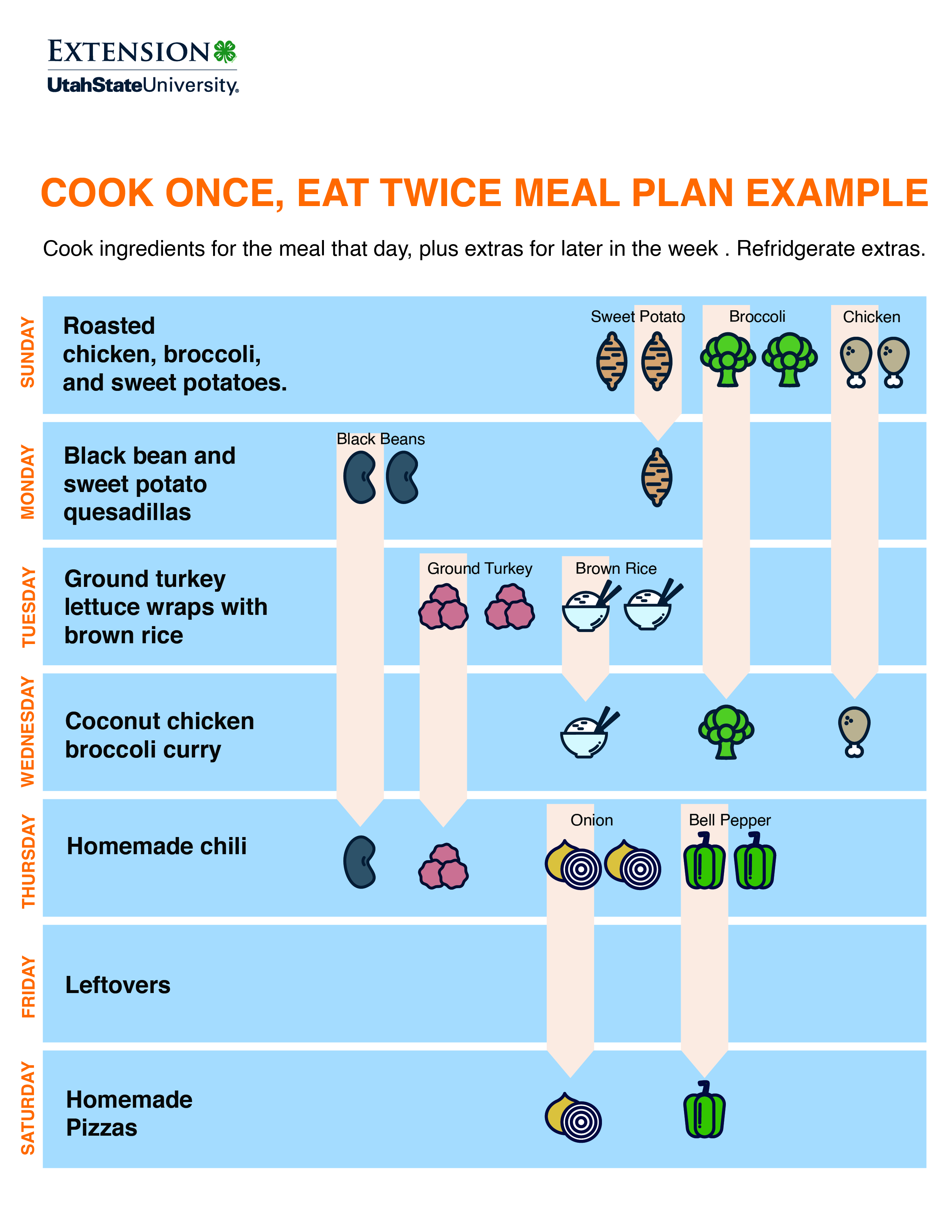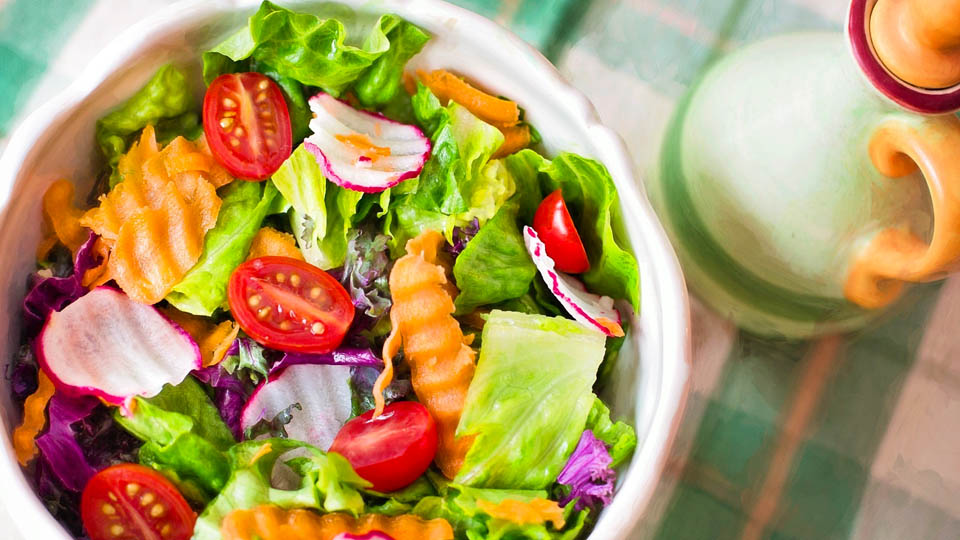Food Waste Prevention Part 4: Using Leftovers

When meal planning, thinking about how to manage your leftovers will help reduce food waste (Schanes et al., 2018). Using your leftovers can also help you save time, labor, and money. Despite this, many things may keep us from using our leftovers: we aren’t sure if they are safe, we forget about them, or we perceive leftovers as less appealing (Schanes et al., 2018). Read on for great information to help you overcome these barriers and learn to love your leftovers!
First of all, be sure to keep your food safe. Follow these food safety guidelines to safely enjoy your leftovers and prevent foodborne illness:
- Leftovers should be promptly wrapped or placed in airtight containers and chilled quickly. Large amounts of leftovers should be divided into smaller shallower containers so they cool more quickly.
- In general, leftovers should be kept in the refrigerator for no more than 3-4 days or frozen for later use. For best quality, frozen leftovers should be used within a few months, but frozen foods remain safe for an indefinite period of time. However, the longer leftovers are frozen, the higher chance of becoming dried out through freezer burn.
- Be sure to use a safe method to thaw your leftovers or reheat without thawing. Safe ways to thaw frozen foods include: in the refrigerator, in the microwave, or in cold water.
- When reheating leftovers, make sure they reach at least 165 degrees Farenheit on your food thermometer.
To help remember if your leftovers are safe, label them with the date. A reminder in your phone or calendar or a note on the fridge can help you remember to eat them within 3-4 days. The USDA FoodKeeper mobile app from the USDA helps you look up storage times for different foods and automatically make calendar reminders. The FoodSafe? mobile app has a similar list of food storage guidelines, in addition to other food safety tools.
Another barrier to eating leftovers is preference, many people do not enjoy eating the same meal for days in a row. To avoid this problem, freeze leftovers and eat them at a later date. Single-serving portions can be easy and low-cost lunches, while large amounts of leftovers can be a great option for dinner on a busy night. Fresh leftovers can also be used as a boxed lunch a few days later.
Leftovers can even become ingredients for meals later in the week using the 'Cook Once, Eat Twice' method. With this method, you plan your meals around key foods that can be prepared in larger quantities and then use the extras to create a totally different meal the next day, or later in the week. In doing this, your leftovers simply become pre-made ingredients for your next meal. Great staple foods for this method include ingredients such as beans, chicken, beef or pork, rice and pasta. Check out this sample meal plan to see what we are talking about:
Cook Once, Eat Twice Sample Meal Plan
Key foods: chicken, sweet potatoes, broccoli, black beans, brown rice, ground turkey, and sautéed onion and sweet pepper.
Sunday
Meal
Sheet pan roasted chicken, broccoli, and sweet potatoes
Cook Extra
Chicken
Sweet Potatoes
Broccoli
Use From Earlier
Monday
Black bean and sweet potato quesadillas https://extension.usu.edu/nutrition/recipes/sweet-potato-and-black-bean-quesadillas
Black Beans
Sweet Potatoes
Tuesday
Ground turkey lettuce wraps with brown rice
Brown Rice
Ground Turkey
Wednesday
Coconut chicken broccoli curry *you can make extra and freeze for another week
Chicken
Brown Rice
Broccoli
Thursday
Homemade Chili
*you can make extra and freeze for another week https://extension.usu.edu/createbetterhealth//ou-files/ezplug/uploads/Creates_Handouts/2_Create_a_Soup.pdf
Sauteed Onion
Bell Pepper
Black Beans
Ground Turkey
Friday
Leftover Day
Saturday
Sauteed Onion
Bell Pepper

Print image in black and white
In Part 5 of this series, you’ll learn about how to properly interpret the dates on your food to know if it is still safe, it isn’t as simple as you might think!
References
- Create Better Health. (2020, October 09). Cook Once, Eat Twice // A Week's Worth of Recipes. Retrieved December 19, 2020, from https://createbetterhealth.org/2020/07/01/cook-once-eat-twice-a-weeks-worth-of-recipes/
- Is My Food Safe? (n.d.). App Store. Retrieved March 18, 2021, from https://apps.apple.com/us/app/is-my-food-safe/id546256041
- Leftovers and Food Safety | Food Safety and Inspection Service. (n.d.). Retrieved March 18, 2021, from http://www.fsis.usda.gov/food-safety/safe-food-handling-and-preparation/food-safety-basics/leftovers-and-food-safety
- Schanes, K., Dobernig, K., & Gözet, B. (2018). Food waste matters—A systematic review of household food waste practices and their policy implications. Journal of Cleaner Production, 182, 978–991. https://doi.org/10.1016/j.jclepro.2018.02.030
- The Big Thaw—Safe Defrosting Methods | Food Safety and Inspection Service. (n.d.). Retrieved March 18, 2021, from http://www.fsis.usda.gov/food-safety/safe-food-handling-and-preparation/food-safety-basics/big-thaw-safe-defrosting-methods
- USDA FoodKeeper. (n.d.). App Store. Retrieved March 18, 2021, from https://apps.apple.com/us/app/usda-foodkeeper/id978186100
Authors
Meghan Adair, Dietetics Student; Carrie Durward, Nutrition Specialist
Related Nutrition Articles







